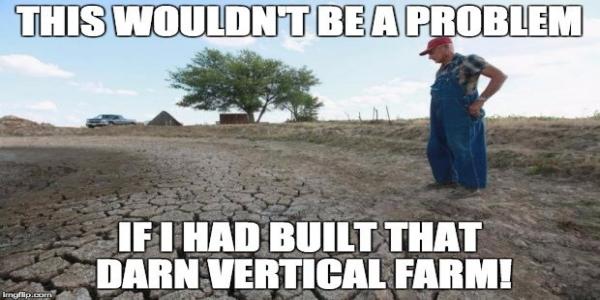Is DIY (urban) farming real or not?
Urban farms all the way down. Or not?

A urban farming movement is global and growing, because in lots of place land is expensive or hard to come by, and most food is needed in cities anyway. In 2013, for example, “the power of cooperation Transformed into a Community Garden a vacant lot in South Chicago”.
Reality check 1:
Small farming is really hard and often, at least in the current economic system**, also economically unsustainable. That is why “nobody wants to work on farms any more”.
Reality check 2: Tech is just the SMALLEST part of the answer
Innovative greenhouse system like lifePOD, that can be used year-round to “produce local food in quantities to feed many people, especially those in food deserts” are part of real solutions, but just small parts.
The same applies to future homes that are “self-sufficient in meat, fish, vegetables and fruit”. Urban farms won’t feed all the residents of cities. Their value lies instead in how they can change us.
The real issues
An Uberisation of the food system just makes the controllers of the software capture the majority of the value. Software or not, any food system dependent on self-exploitation by its workers is not a good system.
On a planetary scale, one issue is not forcing smallholder peasants to feed urban people, for survival wages. It is capitalism in the countryside, and not farming itself, that keeps smallholders poor.
Poorer countries (as well as poor areas of rich countries!) should figure out how to balance agricultural and non-agricultural labour while moving away from dominant agro-export models. Models that, besides other issues, make farm landscape fit to the machinery, rather than the opposite.
In general, there are no serious models for ecologically and humanly sustainable agricultures that rely on technology as a substitute for human attention.
An unavoidable consequence of such a shift is that the more peripheral countries re-orient their agricultural sectors to domestic feeding, well-being, and social development, the fewer foods will be available in the wealthier countries.
Another unavoidable consequence: more people farming
Increasing the percentage of the population in core states involved in farming follows logically from the above points. A corollary would be ensuring that, in this order:
- such work is made as attractive as possible, inviting people to choose it freely, and
- de-centralizing cultural life and social infrastructure lessening the difficulty of the labour involved, through - of course! - technology.
How much we can replace hard labour with constant attention through human presence and careful intervention in natural cycles is another open question. Removing labour, or at least being tied to one’s farm all the time, while still restoring the health of the land? Highly difficult, to say the least. That’s why…
Nobody wants to work on farms any more
We need shorter food chains. But without human labourers, much additional environmental work that could be done on the farm - hedging, ditching, woodland management etc. - doesn’t get done: “nobody wants to work on farms any more”.
And a big part of the problem is money
Or, more exactly, how to make sure that sustainable farming also becomes solvent.
Image sources:
Who writes this, why, and how to help
I am Marco Fioretti, tech writer and aspiring polymath doing human-digital research and popularization.
I do it because YOUR civil rights and the quality of YOUR life depend every year more on how software is used AROUND you.
To this end, I have already shared more than a million words on this blog, without any paywall or user tracking, and am sharing the next million through a newsletter, also without any paywall.
The more direct support I get, the more I can continue to inform for free parents, teachers, decision makers, and everybody else who should know more stuff like this. You can support me with paid subscriptions to my newsletter, donations via PayPal (mfioretti@nexaima.net) or LiberaPay, or in any of the other ways listed here.THANKS for your support!